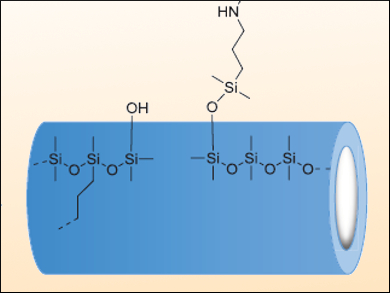Medical devices such as catheters can be colonized by bacteria. This can lead to infections. Antibacterial coatings on the devices, such as antibiotics or silver particles, can lower the risk of infections. However, they can lead to the development of resistant bacteria. Antibacterial peptides, in contrast, work as membrane-disruptors in a mechanical way. It makes the surface less susceptible to promoting bacterial resistances.
Ahmad Mehdi and Gilles Subra, Université de Montpellier, France, and colleagues have developed a strategy to functionalize silicone surfaces, e.g., of catheters, with antibacterial peptides. The team synthesized a dimethylhydroxysilylated analogue of the cationic antibacterial peptide Palm-Arg-Arg-NH2. Pieces of silicone catheters were then activated by oxygen plasma and incubated in a solution of the modified antibacterial peptide at 60 °C for twelve hours. Under these conditions, there is a condensation of the hybrid peptide with silanol groups on the catheter surface, forming stable Si–O–Si covalent bonds (pictured).
The researchers found that the hybrid peptide-grafted catheters killed 92 % of Staphylococcus aureus bacteria within one hour. The coating also prevents the formation of biofilms. According to the team, both the immediate and long-term efficiency of the grafted silicone is superior to similar silver-embedded materials.
- Simple and Specific Grafting of Antibacterial Peptides on Silicone Catheters,
Coline Pinese, Said Jebors, Cécile Echalier, Patricia Licznar-Fajardo, Xavier Garric, Vincent Humblot, Christophe Calers, Jean Martinez, Ahmad Mehdi, Gilles Subra,
Adv. Healthcare Mater. 2016.
DOI: 10.1002/adhm.201600757

